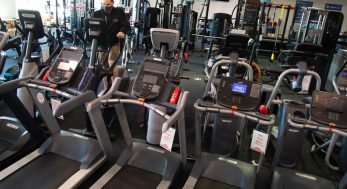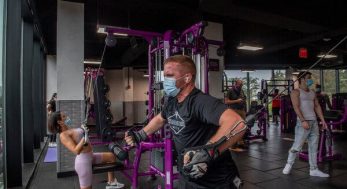Like a New Year’s resolution that was never going to be kept, I woke up on March 13 with grand plans: Every morning while under stay-at-home orders I would work out for at least 30 minutes. Then I decided to start that on March 14. Soon it was the first week of April. Turns out I’m pretty good at excuses, all under the guise of “self-care.”
So I did the next best thing: I turned to video games.
Such a statement isn’t as odd as it may have been in 2007, when Nintendo’s Wii Fit was all the rage. Working out, after all, has become gameified, be it through our apps that keep track of our steps or higher-end, screen-based equipment such as a Peloton bike. And Nintendo’s recent “Ring Fit Adventure,” which is hard to find and going for sometimes double or triple its $79.99 prince on eBay, is an absolute joy. An adventure game that encourages us to mix cardio activities with a Pilates-like ring, “Ring Fit Adventure” is cheerily encouraging as we do battle with a mean dragon.
I had been away from the game for a couple of months, but “Ring Fit Adventure” is a surprisingly adept personal trainer. Many of the upper-body exercises are completed by pulling the ring in and out, allowing it to mimic the activities one would normally associates with a resistance band. But it also encourages us to take breaks, and if we miss a day or two it dials down the difficulty. I appreciate its illusion of awareness and that it’s less rigid than throwing on a video.
And yet there is one ever-so-slight negative with “Ring Fit Adventure.” It’s not the fault of the game so much as my mind. It lives on the Nintendo Switch, which is also home to “Animal Crossing: New Horizons.” And while I can speak only for myself, of course, “Animal Crossing” has been a savior when it comes to easing any anxieties or worries during this time. Its pull is irresistible.
Home fitness, of course, faces many hurdles, as anyone with a bike or treadmill that most often gets used as a place to dry clothes can attest. Should I simply resign myself to gaining back the 30 pounds I lost last year and just worry about it after the pandemic ends? That was the path I was on, at least until my work-at-home desk (it’s a couch) sent my lower back into a red-alert panic mode.
I was going to need to find a way to move. And right now, if it weren’t for virtual reality, I probably wouldn’t be getting any exercise.
Moving inside the headset has resulted in my most intense workouts in months, so much so that I’m planning to cancel my gym membership on the other end of this. While I’m far from the first to discover that virtual reality is pretty great space for working out, I’m somewhat frustrated it took me this long to realize it. After all, some of the lightsaber moments in “Vader Immortal: A Star Wars VR Series” certainly could work up a sweat,
“Beat Saber” is probably the most recognizable VR workout, having made it to late-night television and boasting partnerships with a number of major pop acts. It’s good to get the body moving and the heart rate up. With neon cubes flying at me every Tuesday and Thursday morning, when my schedule goes according to plan, I’m hopping around my kitchen and swinging wildly — only what I see is a tunnel with a cyberpunk aesthetic. I could easily spend 40 minutes in this world.

The VR exercise game “Supernatural” aims to give users a full-body workout in virtual reality. The new game, available for the Oculus Quest, will use a $20 per month subscription model. Credit: Within
(Within)
That I could use a game like “Beat Saber” for a cardio workout was a bit of a surprise to me, only because the one drawback of VR is that I can’t see myself. Yet that turned out to be the greatest advantage of VR workouts. I don’t want to see myself. Even alone in front of my TV with “Ring Fit Adventure” I am self-consciously aware that I am moving like a weirdo in my family room. VR allows me to get out of my own head. In other words, when I can’t see myself, I’m not embarrassing myself.
To exercise, I use the Oculus Quest, which is sold out. But it is cordless and at a price of either $400 or $500 runs cheaper than some high-end fitness equipment. That being said, it’s primary use has been entertainment rather than fitness, although that may be changing, at least if the just-released “Supernatural” from local tech firm Within catches on.
“Supernatural” is designed specifically for working-out in VR, and it’s been destroying me in the best possible way. Unlike in a more game-like experience, even one that encourages swinging and movement, “Supernatural” gives you a virtual coach and places you in postcard-worthy visual landscapes. Think New Guinea islands, the Grand Canyon or Ethopia’s Erta Ale volcano.
I especially like the volcanoes, as the backdrop allows me to pretend I’m training to be a Jedi. But this isn’t National Geographic; the settings, while beautiful, work largely to get you removed from remembering you’re in your own home.
The movements are similar to other rhythm games, such as the aforementioned “Beat Saber,” where the virtual foam-like swords are used to swing at circular objects coming our way. “Supernatural” also throws in plenty of triangles, which are designed to get you to pull off squats or lunges. Because of my back issues, I’ve worked with physical therapists, so I know how to modify some of these movements to work within my abilities.
While “Supernatural” will require a $19-per-month subscription, it has succeeded in getting me as sweaty and sore as when I did morning boot camps. I’m not someone to give certified fitness advice — I sometimes eat Swedish Fish candies for dinner, after all — but a benefit of “Supernatural” is the presence of coaches, filmed so they appear in front of you. The full 360 movement afforded in VR helps make sure I’m moving in the way I’m instructed.
What left me most surprised, however, is that after a few days in “Supernatural” my arms felt as if I had done 100 push-ups. I thought this was an odd sensation, considering I was only holding the Oculus controllers rather than weights. But Within worked with professional coaches to guide players to behave in way that uses their full range of motion rather than attempting to simply become good at the game.

The VR exercise game “Supernatural” aims to give users a full-body workout in virtual reality. The new game, available for the Oculus Quest, will use a $20-per-month subscription model. Credit: Within
(Within)
Though the app will supposedly adjust placement of its objects based on how well we’re moving, I haven’t attempted to fully game the system, so to speak. I just know that after a couple of weeks, “Supernatural” is still challenging me. Within, says co-founcer Aaron Koblin, found that most rhythm games, as players improve, actually result in worse workouts, as they are understanding how to move to win rather than how to burn calories.
“That is not the same objective as creating something that’s focused on large healthy movements — follow through with your swings — the kinds of things you get more from the success of the sport than success of the game,” says Koblin.
After two weeks, as “Supernatural” has succeeded in getting me off the couch, my back pain has decreased. At the end of these stay-at-home orders, I hope to emerge a fully trained Jedi. That’s how this works, right?

